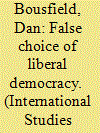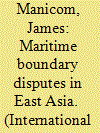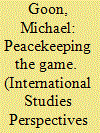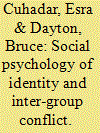|
|
|
Sort Order |
|
|
|
Items / Page
|
|
|
|
|
|
|
| Srl | Item |
| 1 |
ID:
106357


|
|
|
|
|
| Publication |
2011.
|
| Summary/Abstract |
The adoption of UN Security Council Resolution (UNSCR) 1540 in 2004 reflects an emerging consensus that more should be done by the international community to address the proliferation of weapons of mass destruction. UNSCR 1540 articulates a universal, legally binding obligation for all states to confront proliferation by adopting effective export control systems. To date, however, there have been no attempts to systematically analyze compliance with this new obligation, making it impossible to assess the success of this measure and the underlying causes of any shortcomings. This study addresses this by conducting a systematic empirical analysis of state compliance with UNSCR 1540. Drawing upon theories of compliance with international law, we investigate two distinct explanations for variation in the degree to which states adopt nonproliferation export controls: one based on state interests and enforcement and the other based on state capacity. Our statistical tests of these theories use a new, cross-national data set detailing the nonproliferation policies of 30 states. The empirical results indicate that compliance with international nonproliferation obligations is influenced most by a state's economic and governmental capacities and has little to do with interest-based factors. These findings suggest that capacity-building programs are the best option for improving the implementation of UNSCR 1540 and of nonproliferation efforts in general.
|
|
|
|
|
|
|
|
|
|
|
|
|
|
|
|
| 2 |
ID:
106356


|
|
|
|
|
| Publication |
2011.
|
| Summary/Abstract |
This article discusses practical forms of participatory assessment in the international relations (IR) classroom to examine the relationship between teaching and practicing democracy. These techniques include a series of exercises that allow students to explore the links between IR course content and classroom pedagogy. Drawing on the work of Slavoj Žižek, this study examines the ways in which participatory teaching methods challenge students to think about freedom and participation in the classroom and in general. Creating a responsive and participatory classroom generates important questions about the nature of foreign policy creation and the practical and ideological limits on democracy in IR.
|
|
|
|
|
|
|
|
|
|
|
|
|
|
|
|
| 3 |
ID:
106358


|
|
|
|
|
| Publication |
2011.
|
| Summary/Abstract |
The impact of climate change on the circumpolar north has raised the profile of the Arctic Ocean to coastal states and presents serious foreign policy challenges. Chief among these is the pending delimitation dispute over the extended continental shelf between Canada, Denmark, the United States, and Russia. While delimitation disputes are not new to Arctic states, extended continental shelf claims are complicated by the existence of multiple claimants and a still developing international legal regime. To inform policymakers about what to expect from overlapping claims to disputed maritime areas, this paper draws comparative lessons for Arctic policymakers based on East Asia's experience responding to overlapping jurisdictional entitlements created by the UN Convention on the Law of the Sea (UNCLOS). East Asian states have been grappling with the challenge presented by overlapping claims to resource-rich seabeds since the region ratified UNCLOS in the mid-late 1990s. In light of similar geographic conditions (a dispute over a semi-enclosed sea), alliance structures and the relative infancy of the claimant states with UNCLOS entitlements-Canada only ratified the treaty in 2003, and the United States has yet to do so-this paper sets out the case that important comparative lessons can be drawn from the East Asian experience with maritime delimitation disputes.
|
|
|
|
|
|
|
|
|
|
|
|
|
|
|
|
| 4 |
ID:
106354


|
|
|
|
|
| Publication |
2011.
|
| Summary/Abstract |
Political science students face the difficult challenge of understanding the obstacles to resolving intrastate conflict. Often, instructors will use negotiation-based role-playing simulations to model arduous discussions between the warring groups and intervening parties. However, the long-term challenges of directing peacebuilding and ensuring security are equally important parts of intrastate conflict resolution that remain unaddressed in current simulations. The design of simulations with board-game-like rules for teaching about intrastate conflict has also been unexplored. This paper lays out a new type of simulation with board-game-like rules that present realistic obstacles to students as they try to balance the various needs of their assigned state. A detailed discussion of the significance of each of the game rules and potential applications of the simulation is included.
|
|
|
|
|
|
|
|
|
|
|
|
|
|
|
|
| 5 |
ID:
106355


|
|
|
|
|
| Publication |
2011.
|
| Summary/Abstract |
This paper reviews the seminal theories of social psychology which have guided scholarship on inter-group conflicts and describes how these theories have been used by conflict resolution practitioners to design Track Two diplomacy initiatives among citizens in conflict zones. The authors hope that such a review will provide scholars of conflict resolution and international politics with a better understanding of how complex social theories are adapted for use in the applied world, and how gaps between theory and practice can be identified and addressed. The paper begins with an overview of three of the main theoretical contributions of social psychology to the problem of inter-group conflict: social identity theory, stereotyping and prejudice, and contact theory. We then review how these theories have been applied by conflict resolution specialists in international and ethnic conflicts as they have sought to moderate intergroup hostilities in conflict zones. The paper concludes with an analysis of the gaps between theory and practice, namely: theory of change gap, transfer strategies gap, and unit of analysis gap. Finally, based on the reviewed social psychology research, the article makes policy recommendations about how these gaps between theory and practice can be narrowed.
|
|
|
|
|
|
|
|
|
|
|
|
|
|
|
|
| 6 |
ID:
106353


|
|
|
|
|
| Publication |
2011.
|
| Summary/Abstract |
This study considers the clash between views on what is ethically permissible and the claimed imperatives of the war on terror. It does so by examining the forms of reasoning that members of the US public apply when judging the acceptability of torture as a tool of that war. Moral judgments are formed around two models of ethical reasoning. The first, usually referred to as the deontological perspective, deems that the ethical merit of an act is intrinsic to its character. The second, consequentialist, view, evaluates ethical merit by the consequences an act produces (for example, lying might be good). Because, however, policies often are judged in light of both perspectives, ethical impulses do not always point in the same direction. Our study uses both survey analysis and experimental methods to elicit the relative weight of deontological and consequentialist arguments that have been marshaled for and against torture. We find that across various levels of torture, the former dominate in the public mind. We also find that, counterintuitively, attitudes toward the abusive treatment of terrorist suspects are not significantly related to the intensity of the perceived foreign threat.
|
|
|
|
|
|
|
|
|
|
|
|
|
|
|
|
|
|
|
|
|